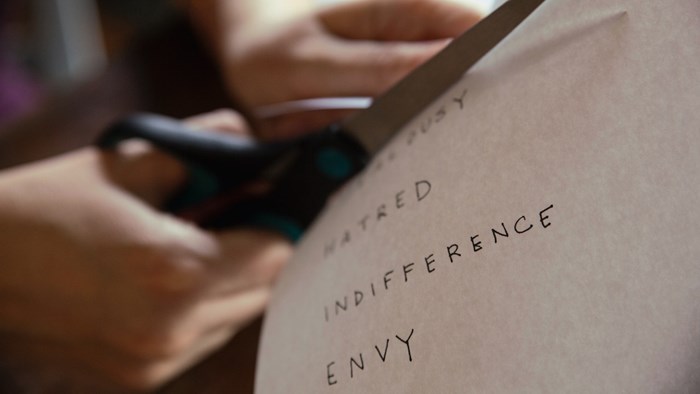What Rachel and Leah Can Teach Us About Rivalries in Leadership

The Bible gives us many pictures of messy, real relationships, and the story in Genesis of the two sisters Rachel and Leah one example. Their rivalry over their cousin Jacob, and over having children, led to a fractured relationship and emotional anguish.
I relate to Rachel and Leah, because I too often compare myself to others and can even manufacture rivalries where none exist. Leah compared herself to Rachel and felt that she came up short, because Jacob loved her sister more. But Rachel compared herself to Leah and felt that she was on the losing end of the equation, because Leah was fertile.
In case you’re not familiar with the story, in Genesis 28 and 29, Jacob fell for Rachel and agreed to work seven years for her hand in marriage. However, her father, Laban, decided to trick Jacob and sent his oldest daughter Leah in to meet with Jacob in the darkness of the wedding chamber instead of Rachel.
When Jacob confronted Laban, the elder man offered to give Rachel as another wife to his nephew, on the condition that Jacob work seven more years for him. Jacob agreed.
Leah must have felt awful to be rejected not once but twice—first, when Jacob asked for her younger sister Rachel’s hand in exchange for working for Laban, and second, after Leah spent a night in his arms. It’s understandable if jealousy, envy, shame, and disappointment swirled inside her. Genesis 29:30 plainly states Jacob “loved her [Rachel] more than Leah.”
After only a week with Leah as his bride, Rachel became his second wife. Just as Leah surely felt “less than” beside her beautiful and adored sister, Rachel must have felt betrayed by Laban and Leah’s deception on what was supposed to be her wedding night. After a seven-year betrothal, she was deceived just as Jacob was.
The rivalry between the sisters became even more intense in the latter portion of chapter 29 and into chapter 30 of Genesis, when Leah began having children and gave Jacob four sons. Sadly, after delivering each of the first three boys, Leah voiced her fervent hope that Jacob would love her or even just “connect” with her.
However, even though Rachel had Jacob’s heart from day one, she was extremely jealous of Leah’s ability to bear children. Back then, childlessness was seen as a curse, which explains why Rachel told Jacob to “give me children or I die.”
Leah’s life had its low points, for sure, but God did bless her with many children. Her brood included Levi, from whom Israel’s priestly line/descendants came, and Judah. And in the ultimate redemption, Jesus came from Judah’s line.
Leah was also buried next to Jacob in the family tomb and was listed as part of God’s “who’s who” in Genesis 49:31, along with Abraham, Isaac, Jacob, Sarah, and Rebekah. How awesome God’s redemptive story is!
Rachel and Leah’s relationship reminds me that we won’t clearly see all God is doing this side of Heaven. It also challenges me.
Too often, I’m not content with the gifts God has given me and feel envious of another person’s good fortune. At times, I’m jealous when a fellow leader receives an accolade I’d love to receive, or when another author receives an acceptance from a publisher who rejected me. I can even become jealous of a ministry leader’s social media following. Maybe you struggle in this way, as well.
While social media has helped us connect with fellow believers all over the world, it also makes it easier for us to compare ourselves with others, measuring our real lives by their curated accounts.
The enemy of our souls knows that he can plant or play on insecurities and doubts about our worth to tempt us to jealousy, envy—even self-hatred. He places menacing thoughts in our heads: I’ll never measure up. No one will ever recognize my hard work. Why isn’t God using me like He’s using him (or her)? What does he/she have that I don’t? What if I never get the opportunities they’re enjoying?
We can take encouragement from these truths: we measure up because of Jesus’ death and resurrection. We’re worthy because of His righteousness. God loves us and He proved it once and for all on the cross. And He has a perfect plan for each of us, according to our gifts, abilities, and personalities.
When we succumb to Satan’s schemes, we lose sight of who He has created us to be, and what He has specifically called us to do. We also forget that we only see a glimpse of someone else’s life, not the whole picture.
I pray that the story of Leah and Rachel leads us to drop the comparison game, confess our sins of jealousy and envy, and turn our attention back to God. When we live in communion with Him, He makes our lives everything He created them to be—in His perfect timing.
I Peter 2:9-10 (MSG) reminds us, “But you are the ones chosen by God, chosen for the high calling of priestly work, chosen to be a holy people, God’s instruments to do his work and speak out for him, to tell others of the night-and-day difference he made for you—from nothing to something, from rejected to accepted.”
Because of who Christ is, we are chosen, holy, called, accepted and royal. And we shouldn’t waste time feeling rejected (even if we’ve been rejected by people), because God’s word tells us we have work to do; namely, telling others about the difference Jesus has made in our lives.
So if you're weary of comparison, jealousy, and envy--take heart! God has a journey planned for us that rivals anything our minds can imagine.
Dena Dyer is a professional speaker and Bible teacher, as well as the author or co-author of twelve books, including Wounded Women of the Bible: Finding Hope When Life Hurts with Tina Samples. She serves as Communications Specialist for Wheaton’s Humanitarian Disaster Institute.
The Better Samaritan is a part of CT's
Blog Forum. Support the work of CT.
Subscribe and get one year free.
The views of the blogger do not necessarily reflect those of Christianity Today.






















